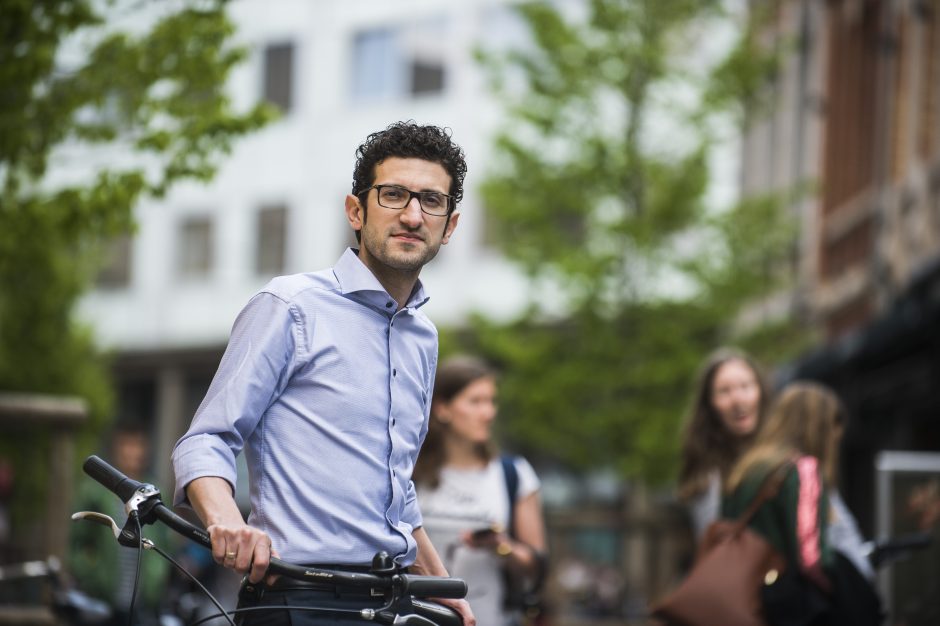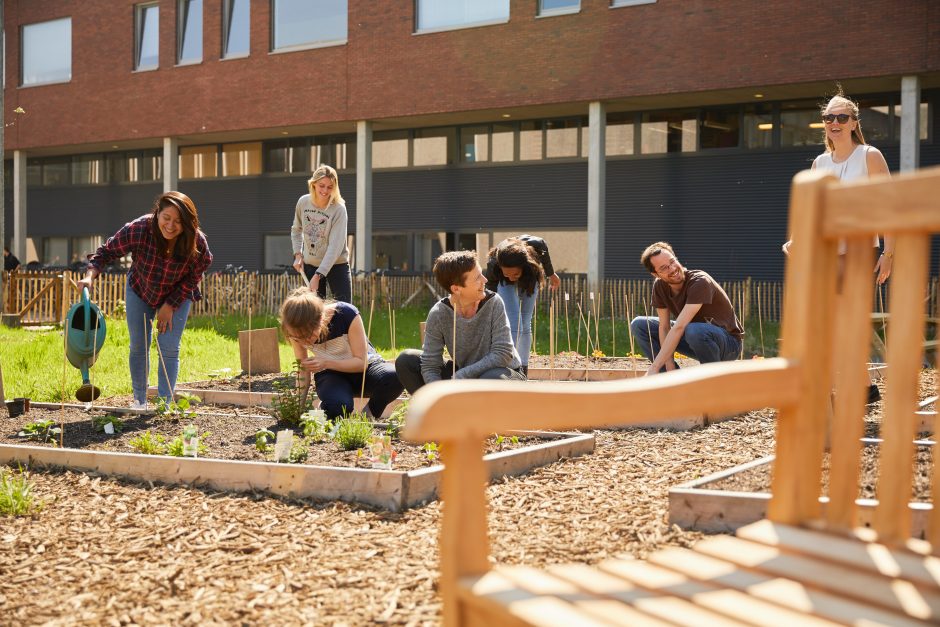Cities in a 1.5 degree world: What is there to learn from Leuven’s Mayor Ridouani?

As Climate KIC embarks on an ambitious series of systems innovation initiatives to accelerate the radical changes we need to see in cities, land-use, industry and finance, we speak to one of Europe’s most ambitious municipalities to learn what a systemic approach looks like in the city of Leuven.
Leuven is one of 15 cities across Europe taking part in Climate KIC’s Deep Demonstration of Healthy, Clean Cities—the first cohort in an initiative we aim to grow exponentially. A leading force behind Leuven’s climate plan and founder of Leuven 2030 is Mohamed Ridouani, the city’s mayor.
Climate KIC, sat down with Mayor Ridouani during COP25 to discuss the role of systems thinking in the city’s decarbonisation strategy and to learn about his hopes for Leuven’s involvement in our Deep Demonstration of Healthy, Clean Cities.
After the climate talks in Madrid last year, it’s clearer than ever that more of the same will not deliver net zero in time. Climate emergency demands that we think and act differently. Ideas are easy. Systemic change is messy and difficult. It will require us to look beyond a technology-led energy transition towards joined-up, mission-led innovations spanning behaviour, mindsets and creative arts; finance and governance; technology, education, regulation and policy.
A Deep Demonstration of Healthy, Clean Cities
In 2019, EIT Climate launched eight Deep Demonstrations as a test bed environment for precisely this kind of joined-up approach to large-scale systemic change for climate action. The projects focus on eight critical opportunities for achieving 1.5C-consistent transitions while also bringing benefits to people, places, economies and environments.
Cities are one of these eight focus areas. Home to around three-quarters of Europe’s population and responsible for a similar proportion of the region’s emissions, cities have to change.
The 15 cities in our Healthy, Clean Cities Deep Demonstration have embarked on an intense, ten-year journey to achieve carbon neutrality by 2030. Participants range from national capitals, such as Amsterdam, Copenhagen, Edinburgh and Madrid, through to hubs of urban innovation, such as Leuven, Malmö, Skopje and Niš.
Building inclusivity and breaking down siloes
At the heart of the Deep Demonstration methodology is a readiness and intent to work differently, embrace transformational outcomes and adopt a systemic approach. Notably, all participating cities operate inter-departmental municipal teams and have robust systems to involve stakeholders in every step of the way.
Leuven: A radical roadmap with clear intent for transformational change
Take the Belgian town of Leuven. Located just to the east of Brussels, Leuven is home to Belgium’s largest—and one of the world’s most innovative—universities. It also plays host to a number of large industries, including the headquarters of Anheuser-Busch InBev, the world’s largest brewer. Both factors have led to a unique demographic make-up, with students making up one third of the resident population with three-quarters of citizens transiting to the city for work.
A signatory of the Covenant of Mayors, Leuven also stands out for the political leadership that it has exhibited on climate change. Despite considerable population and economic growth, for example, the city has succeeded in keeping its climate emissions flat since 2010. Last year the NGO Leuven 2030 (in which the local government is represented) launched a bold, multi-pronged plan to achieve climate neutrality by 2050. Impressively, the roadmap incorporates indirect emissions into its goals, including those linked to transport into the city. The plan also commits the city to achieving its carbon goals in a way that is socially just and stimulates (not stymies) the local economy.
Meet Mohamed Ridouani: A mayor on a mission

A leading force behind Leuven’s climate plan and founder of Leuven 2030 is Mohamed Ridouani, the city’s mayor. Climate KIC, sat down with Mayor Ridouani during COP25 to discuss the role of systems thinking in the city’s decarbonisation strategy and to learn about his hopes for Leuven’s involvement in our Deep Demonstration of Healthy, Clean Cities.
Back in 2013, Leuven took the novel step of setting up Leuven 2030, a non-profit organisation, to deliver your commitment to carbon neutrality. It is highly unusual for a municipal authority to devolve responsibility in this way. What was the thinking behind the move?
“I was deputy mayor when we started on this journey. Despite our best efforts in the city administration, I could see that efforts by the municipality alone would never be enough. So the idea grew for a governance model that could bundle all the city’s creativity and ambition together behind one vision. The model itself, Leuven 2030, didn’t come down from heaven. It emerged out of an 18-month process of discussions. As you’d expect, there was lots of back and forth between our five main stakeholders; the city government, citizen groups, knowledge institutions, companies, and investors. It’s the world’s biggest organization—counting more than 600 members at this point—to be built up in that way and, five years on, it is pushing forward the climate agenda very fast. In fact, as mayor, it has inspired me to adopt a similar approach in domains such as the economy, social affairs and education.”
Working inclusively with all actors in a system—and going well beyond the usual suspects in terms of who and what may be considered a systems actor—is core to the systems innovation approach that Climate KIC is experimenting with through the Deep Demonstrations. What is it like to work in this way and how is it different from conventional policy approaches?
“In our case, with Leuven 2030, I describe this as a 3D governance model because it’s an entirely open and transparent organisation. Anyone can become a member or get elected to the board. To be a board member, you need to present a binding action plan. In that way, we avoid green washing. Because anyone can join, it means that there’s a huge amount of expertise to draw on—far more than we could ever hope to amass within an organisation like the city administration. Because it’s so diverse and so open, new ideas are constantly bubbling up to the surface. It’s a genuine factory of ideas that draws on collective intelligence and creates connections across siloes.
Unlike the usual top-down approach to policymaking, our model involves everyone, including citizens at the grassroots. I don’t describe it as bottom-up, though. I prefer the term horizontal. We consider each other as equals, as partners. Everyone has a role to play and everyone is recognised for the positive contribution that they make. Involving so many different people also means the interventions that emerge cover the full spectrum of the city. Our “Roadmap 2025|2035|2050” involves 80 different areas of action, from making new buildings climate-neutral and greening public transport through to using more local biomass for clean energy and promoting the sharing economy. It’s a real systems-wide approach in this sense, with widespread ownership guaranteeing levers for more radical change.”
So this inclusive Leuven 2030 set-up actually came up with the action points for your climate strategy? How did that decision-making model work in practice?
“Yes. First, we worked together with the university in Leuven to carry out a scientific needs assessment. This gave us a good idea of priorities around which we could build a framework of actions. They designed the “Roadmap 2025|2035|2050,” with interim pathways for 2025 and 2030 and so on. The roadmap provided a whole bundle of different possible actions based on a variety of scenarios. This means we can go to our stakeholders across the city and say, “Look, this is what needs to be done, how do we tackle it?” And we opened it up for people to have their say. Being a member of Leuven 2030 makes you part of the general assembly and gives you a vote. We held brainstorming sessions and together came up with pilot interventions that people could join. The only condition for joining one of the pilots is a pledge to contribute your own efforts and creativity and to be willing to share your ideas so they spread.
Presumably, this horizontal approach to systems innovation means key actors in Leuven feel ownership of the city’s carbon strategy?
“That’s exactly it. Let me give you just one example. Back in 2016, we introduced a new circulation plan for the city centre to reduce traffic and to create more space for pedestrians and cyclists. It was a very ambitious move but it was also highly contested. Some of the shop owners said it would reduce business, while some citizens claimed it was limiting their freedom with their cars. But because the idea grew out of Leuven 2030, there was a broad coalition of people behind the idea. As a politician, this helped me push back against this opposition and take this critical climate measure. Politically, many people told me I was crazy, but we came through the turmoil. In fact, not long afterwards, I was elected mayor.”
All our Deep Demonstrations are rooted in involving critical stakeholders from across the systems in question. What’s your advice for achieving widespread participation?
“Above all else, you need a common goal and mission that really grabs people. It needs to be something really compelling, something that motivates people to get behind it. When we talk about improving the quality of life in Leuven by making the city healthy and green, it gives everyone a warm feeling. The other crucial factor is to demonstrate progress. What difference is their involvement making? In Leuven, we’ve been able to show tangible change already. In just three years, for example, the number of people cycling has increased by 44 per cent. That’s an amazing achievement in such a short time. It takes time for everyone to get on board with the idea, but the more time passes, the more it feels like a community phenomenon. Today, becoming green has become part of the city’s identity. As mayor, I seek to reinforce this wherever I can. In particular, in my conversations with leaders across the city—in industry, business, education, civil society—I try to connect their leadership around our systemic climate goals.”
Leuven is obviously already active on multiple fronts in combatting climate change. What are you hoping to gain from working with Climate KIC on a system innovation approach?
“Much of the debate around climate policy occurs at the national level, but it’s in cities like Leuven where we really feel the impact. It’s also in cities where real action against climate change has to happen. And it is happening. In Leuven, for example, we recently upgraded our sewage system to deal with the increased rainfall that we are now experiencing. Across Europe, there are many cities also doing good things. Being part of Climate KIC’s Deep Demonstration gives us the opportunity to connect with some of these leading city innovators and to learn together through deliberate collaboration and knowledge-sharing. It’s what being part of the EU is all about. In my view, this ability to share knowledge and move forward together is one of the key strengths of Europe and a critical part of the region’s capacity to develop climate solutions.
When it comes to transition to a low-carbon society, we’re all on this journey together, right? In that sense, I see cities like ours as experimental labs. We’re a small city, but we have a strong knowledge base thanks to the university and a progressive-minded citizenry. We want to share our insights but, more than that, we have a huge appetite to learn – about how to scale up our efforts, about how to best finance this transition, about how to keep people motivated? There are still so many questions. No-one has all the answers, which is why it’s best to cooperate in finding the best answers.”
To learn more about the Clean, Healthy Cities Deep Demonstration, click here.
More information on Leuven 2030 and its actions to become climate neutral is available here.


